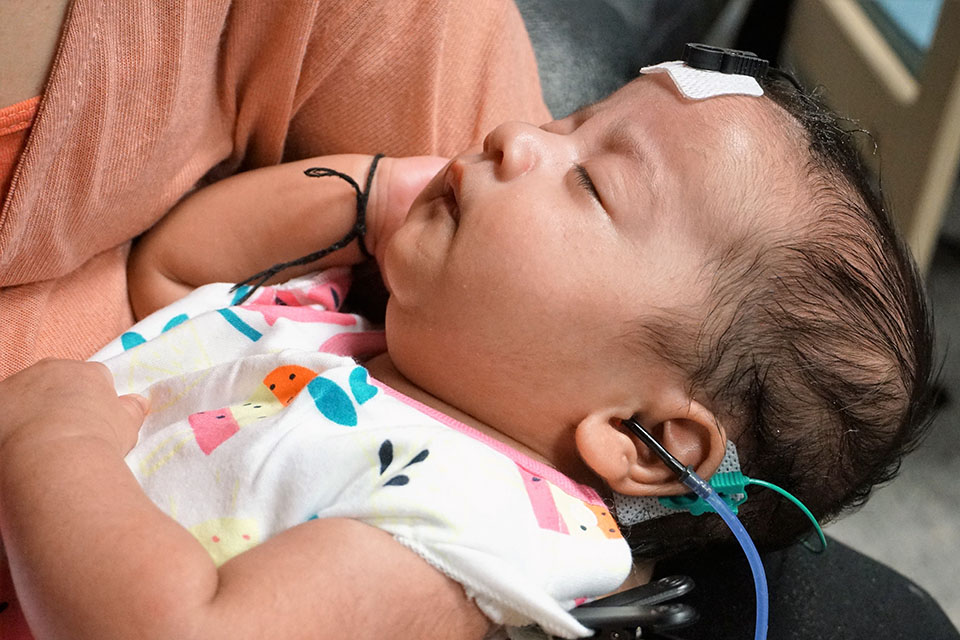Newborn hearing screening: your baby’s visit to the audiology clinic
Updated 2 December 2021
Public Health England (PHE) created this information on behalf of the NHS. In this information, the word ‘we’ refers to the NHS service that provides screening.
This information explains why your baby needs to see an audiologist for more tests at an audiology clinic and what those tests involve. An audiologist is a health professional who specialises in hearing.
The short video below (the second version signed in British Sign Language) explains how you can prepare for your baby’s audiology appointment and what will happen at the audiology clinic.
Your baby’s visit to the audiology clinic animation
A British Sign Language signed version is also available.
1. Your baby’s visit to the audiology clinic
Audiology clinics have special equipment to test your baby’s hearing. These tests will give better information about your baby’s hearing.
Early testing means you will know if your baby has a hearing loss when they are still very young. This is important for their future development.
Your baby needs more tests because their hearing screening tests did not show a clear response in one or both ears. About 2 to 3 babies in every 100 do not show a clear response and are referred to audiology.
Most babies tested at an audiology clinic are found to have satisfactory hearing.
About 1 in 15 babies tested at the audiology clinic have a permanent hearing loss in one or both ears. Some have a temporary hearing loss. Finding out about hearing loss early gives babies a better chance of developing language, speech and communication skills as well as making sure their families receive the support they need.
It is important you bring your baby to the appointment. This is because they may need other tests to find a possible cause if they do have a hearing loss. These tests should be performed within the first few weeks of birth.
Some babies who have a hearing loss do react to sounds. The hearing loss may not be picked up without the tests in audiology.
If your baby does have a hearing loss, it is important to find out as soon as possible.
2. What happens at the clinic

The appointment will usually take about 1 to 2 hours. This includes time to settle your baby. The tests give more detailed information about your baby’s hearing. They will not hurt or be uncomfortable for your baby. You can stay with your baby while they are tested.
The audiologist may use an otoacoustic emission (OAE) test. This involves putting a small soft-tipped earpiece in the outer part of your baby’s ear. The earpiece sends clicking sounds down the ear.
The inner part of the ear, known as the cochlea, usually produces a response when it receives sound. The testing equipment can pick up this response.
They may also use an auditory brainstem response (ABR) test. This involves placing small sensors on your baby.
Sounds at different frequencies are played in your baby’s ears. A computer records the response so the audiologist can measure how well your baby’s ears respond.
Your audiologist will tell you what the results mean and if your baby needs any more appointments.
3. Possible results
If the tests show a hearing loss, your audiologist will explain what the results mean. Your baby may need more tests to measure the amount and type of hearing loss.
The results of the tests will help the audiologist give you and your baby the right support and information.
If you are told your baby has satisfactory hearing, this means they are unlikely to have a hearing loss. But children can develop a hearing loss later, so it is important to check their hearing as they grow up.
Your personal child health record book contains checklists of the sounds your baby should react to and the sounds they should make as they grow older.
If you have any concerns you should discuss them with your health visitor or GP. Your child’s hearing can be tested again at any age.
4. More information
You can contact the audiology department that will carry out the test. You can also speak to your hearing screening team, health visitor, midwife or GP.
If the time of the appointment you have been given is not convenient, please telephone to rearrange. As you may be in the audiology clinic for a while, please make sure you have enough nappies and feeds for your baby. You may also want to bring somebody with you.
Read more about newborn hearing on the NHS website.
Contact the National Deaf Children’s Society:
- freephone helpline: 0808 800 8880 (10am to 5pm, Monday to Friday)
- email helpline@ndcs.org.uk
- visit www.ndcs.org.uk
The NHS Screening Programmes use personal information from your NHS records to invite you for screening at the right time. Public Health England also uses your information to ensure you receive high quality care and to improve the screening programmes. Find out more about how your information is used and protected, and your options.
You can contact us for a Braille version of this leaflet.
Get more information about newborn hearing screening.
